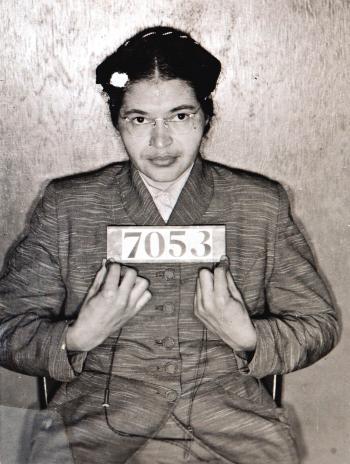We have lost a legend who reminded us of the power of one human being to change the world. And we have gained, from her lessons and legacy, the ability -- indeed, the mandate -- to not let that world-changing spirit grow stagnant.
Rosa Parks died October 24, 2005. She was 92.

In 1955, in refusing to give up her seat on a segregated Montgomery bus, Mrs. Parks sparked a 381-day boycott and helped this nation and the world challenge racism. Here in Montgomery -- where we work just blocks from where Rosa Parks boarded that bus on December 1, 1955 -- the 50th anniversary of the boycott has begun.
Mrs. Parks' lessons, consciously and unconsciously, shape this and every issue of Teaching Tolerance magazine. When we write about borders, about divisions, about the gulf between rich and poor, we recall her spirit. When we stand up for the principles we believe in, even when the odds seem impossibly stacked against us, we honor her courage. When we find ways to bring change to our schools, our cities, our lives, we honor her determination.
But half a century after her courageous actions, questions loom. How far have we come, really? And how far have we left to go?
Those questions struck me deeply when my family joined hundreds of others to pay tribute to Mrs. Parks as she lay in honor here in Montgomery five days after her death. We arrived in the early afternoon, waited in line, walked past the open casket and exited the church.
"The only tired I was, was tired of giving in."
Rosa Parks, 1913-2005
As we walked toward our car, a CBS Radio reporter approached, looking more than a bit sheepish. "Excuse me. Would you mind being interviewed?" A pause. More sheepishness. "We're having trouble finding white people to talk to."
Montgomery is a 50-50 city -- 47.7 percent white, 49.6 percent black, to use exact census figures. So anytime I -- a white transplant from the West -- find myself in an all-white or all-but-me-black environment, I wonder about issues of segregation, exclusion and division. Such moments happen in restaurants, churches, neighborhoods, stores and movie theaters; they are not rare, but they remain disturbing.
Still, I did not expect Mrs. Parks' home-going to be so segregated. If ever there were a time for all of Montgomery, black and white, to gather together to pay our respects, it was for Mrs. Parks.
Wherever we live, whatever divisions challenge us, we owe Mrs. Parks -- and ourselves, and each other -- more than that. So much more.
—Brian Willoughby